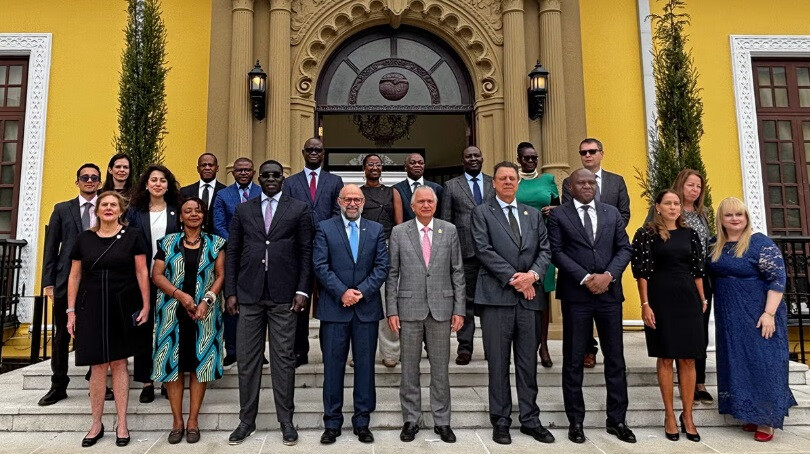
SAN JOSÉ, COSTA RICA – Costa Rica this week welcomed ministers and high-level representatives from five African nations – Côte d'Ivoire, Guinea, Kenya, Senegal, and Zimbabwe – for the inaugural GEF Knowledge Exchange for Policymakers. The seven-day program provided a firsthand look at how Costa Rica has successfully utilized resources from the Global Environment Facility (GEF), cultivated strategic partnerships, and implemented effective policies to achieve significant environmental transformation while simultaneously improving the livelihoods of its communities.
Participants engaged in a comprehensive agenda that included meetings with key Costa Rican government officials and immersive site visits to exemplary GEF-supported projects in Monteverde and Guanacaste National Park. These locations showcased the tangible results of decades of investment in ecological restoration, thriving ecotourism initiatives, and robust conservation efforts. These projects have not only dramatically enhanced Costa Rica's natural environment but have also been pivotal in the nation's economic and social advancement.
A central focus of the exchange was highlighting Costa Rica's sustainable development model, which emphasizes the effective deployment of GEF funding, strategic institutional capacity building, strong political coherence, and the innovative creation of financial instruments like Payment for Ecosystem Services (PES). This model was presented as a potential blueprint that can be adapted and replicated by other nations in the Global South facing similar environmental and developmental challenges.
"Costa Rica demonstrated to African policymakers its exemplary GEF projects, implemented in close collaboration with local communities who benefit from access to financial resources, technical expertise, and other crucial instruments," stated Carlos Manuel Rodríguez, CEO and Chairperson of the GEF, underscoring the practical and community-centered approach showcased during the exchange.
Globally recognized as a leader in environmental conservation, Costa Rica has consistently leveraged the GEF as its primary financial mechanism to accelerate its green transition. Strategic investments in biodiversity and forest protection, coupled with the enactment of progressive environmental protection policies, have been instrumental in this transformation. Costa Rica’s journey towards a sustainable and resilient growth model serves as a compelling example of how environmental stewardship and economic development can be mutually reinforcing.
Arnoldo André, Minister of Foreign Affairs of Costa Rica, emphasized the collaborative spirit of the event, stating, "This exchange was more than just a dialogue. It was a valuable opportunity to forge a shared vision for a future where conservation and development are intrinsically linked, benefiting both people and planet."
Key insights gleaned by the participating African policymakers included:
The Power of Leadership and Vision: Participants recognized the critical role of strong and visionary leadership in fostering connectivity, integration, and a holistic approach necessary for the widespread adoption and long-term success of sustainability initiatives. Creating broad buy-in across sectors is paramount.
Integrating Science into Decision-Making: The exchange highlighted the indispensable link between robust scientific research and effective policy formulation. Data-driven decision-making is crucial for achieving sustainable and impactful outcomes.
Empowering Youth and Engaging Communities: The importance of educating and involving younger generations, alongside local communities, was strongly emphasized. This includes promoting environmental literacy, fostering a sense of ownership, and exploring hybrid management models to cultivate an informed and engaged citizenry.
Strategic Public-Private Partnerships (PPPs): Efficiently leveraging PPPs was identified as a key strategy for maximizing the impact of available funding, including resources from the GEF. Understanding how governments can effectively collaborate with the private sector is essential for scaling up sustainable development efforts.
Effective Communication and Visibility: Clear and accessible communication strategies are vital for ensuring the visibility and success of environmental projects. This includes simplifying complex information, utilizing accessible platforms, and fostering understanding and collaboration among diverse stakeholders.
Ensuring Institutional Coherence and Robust Implementation: Participants underscored the necessity of establishing strong institutional frameworks and ensuring the effective on-the-ground implementation of environmental policies. This involves transforming environmental challenges into opportunities for economic and social progress and ensuring the long-term adaptation and strengthening of projects.
The successful GEF Knowledge Exchange underscores the growing importance of South-South cooperation in addressing global environmental challenges. By sharing practical experiences and successful models, countries in the Global South can accelerate their transitions towards more sustainable and resilient futures.
Further Background on GEF and Costa Rica's Environmental Leadership:
The Global Environment Facility (GEF) is a multilateral financial mechanism dedicated to addressing the world's most pressing environmental challenges. It provides grants and concessional financing to developing countries for projects that address biodiversity loss, climate change mitigation and adaptation, land degradation, international waters, chemicals and waste management, and ozone layer depletion.
Costa Rica has long been recognized as a global leader in environmental conservation. Its commitment to protecting its rich biodiversity has led to the establishment of an extensive network of national parks and protected areas, covering a significant portion of its territory. The country has also been a pioneer in developing innovative mechanisms for environmental finance, such as its Payment for Ecosystem Services program, which compensates landowners for conserving forests and other ecosystems that provide valuable services like carbon sequestration and water purification. Costa Rica's ambitious goals include achieving carbon neutrality, further solidifying its position as a champion of sustainable development.
This Knowledge Exchange marks a significant step in fostering greater collaboration and knowledge sharing among developing nations in their pursuit of a greener and more prosperous future for all.
[Copyright (c) Global Economic Times. All Rights Reserved.]






























